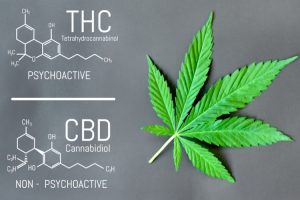What is cannabidiolic acid (CBDa)?
What is cannabidiolic acid (CBDa)
 Believe it or not, CBD is present on growing cannabis plants in only very small amounts. In growing plants, CBD exists as cannabidiolic acid (CBDa). It isn’t until the plant is cut, dried, and heated that CBD is formed. CBD is a calming phytochemical that does not cause a psychotropic experience.
Believe it or not, CBD is present on growing cannabis plants in only very small amounts. In growing plants, CBD exists as cannabidiolic acid (CBDa). It isn’t until the plant is cut, dried, and heated that CBD is formed. CBD is a calming phytochemical that does not cause a psychotropic experience.
Cannabis flowers go through major transformations as they dry. In fresh flowers, the active components are found as acids. When cannabis is dried and heated, these acids break down into more famous compounds like THC and CBD. THC is the primary psychoactive in the cannabis plant.
Cannabinoids like THC and CBD, which have been studied over the past four decades, have long been thought of as the main therapeutic compounds in the cannabis plant. However, emerging preclinical evidence suggests that there may be some benefit to keeping the plant raw.
Here, “raw cannabis” refers to fresh leaves and flowers that have not been dried, cured, or heated.
Since CBDA is a precursor chemical to CBD, it is a natural compound found in the raw plant. People who juice raw cannabis tend to enjoy a serving of CBDA. It is also present in raw hemp oil products and also in non-decarboxylated or non-filtered CBD oil products.
CBDa is one of an estimated 113 compounds known as cannabinoids in the cannabis plant.
Unfortunately, the majority of cannabis research has focused on psychoactive THC or activated CBD, not CBDa. This means that the little information that is available is subject CBDa transforms cannabis removes the acid group from CBDa and transforms it into CBD. While clinical trials are lacking, many medical cannabis patients utilise activated CBD as their primary treatment while adding in raw cannabis juices, smoothies, and foodstuffs as additional support.
What are the benefits of CBDa?
Unfortunately, substantial research on CBDa is lacking. However, preliminary research in the lab suggests that CBDa may be helpful in four distinct therapeutic areas. These include:
1.) Inflammation
Laboratory research performed in cell cultures has found that CBDa has potential anti-inflammatory properties. A 2008 experiment published in Drug Metabolism and Disposition has found that CBDa is a selective COX-2 inhibitor. Simply explained, COX-2 is an enzyme that plays a role in the development of pro-inflammatory compounds called prostaglandins. This enzyme is a target of non-steroidal anti-inflammatory drugs (NSAIDS), like aspirin and ibuprofen.
Inflammation is a natural and important response to stress, injury, and illness. However, chronic inflammation is painful and can be detrimental to health. Arthritis is one example of a chronic inflammatory condition.
The 2008 research discovered that naturally occurring CBDa selectively blocked the COX-2 enzyme, reducing its ability to synthesize pro-inflammatory compounds. The researchers found that CBDa was more successful than its counterpart, tetrahydrocannabinolic acid (THCA).
2.) Nausea & vomiting
As it turns out, some raw cannabis juice might be helpful for a queasy stomach. At least, if rodent research has anything to say about the subject.
A 2012 study published in the British Journal of Pharmacology has found that CBDa treatment reduces
nausea behaviours in rodents. The study also found that the cannabinoid reduced vomiting in shrews. When compared to activated CBD, the researchers found that CBDa was actually more powerful in quieting an upset stomach.
3.) Anti-cancer
Research from 2012 has found that CBDa effectively halted migration in breast cancer cells cultured outside of the body. While experiments conducted in petri dishes are no comparison to clinical human
trials, the cannabinoid did show some positive effects against a highly invasive form of breast cancer.
Specifically, the CBDa treatment seemed to prevent the migration of breast cancer cells. In theory, a therapy that stops cancer cell migration would prevent the disease from spreading to other parts of the body.
Cell culture research from 2014 had similar findings, suggesting that treatment with raw CBDa altered the expression of genes associated with invasive breast cancer metastasis. The cannabinoid also down regulated the enzyme COX-2, which can amplify breast cancer migration.
4.) Psychosis
As with almost all cannabis research, high-quality studies on CBDa for anxiety are sorely needed. However, one biopharmaceutical company already has a patent on CBDa for the potential treatment of psychotic disorders. Britain’s GW Pharmaceuticals included CBDa into a patent on the use of cannabinoids in conjunction with antipsychotic medications. The patent also included the cannabinoids CBD, THCV, THCVA, CBC, CBCA, CBG, and CBGA.
Source: https://news.green-flower.com/what-is-cannabidiolic-acid-what-does-it-do/
If you are interested in experiencing the potential benefits of CBD and CBDa you can purchase our Raw Hemp Full Spectrum Extract Oil 500mg CBD+CBDa – 10ml which includes free UK delivery.

